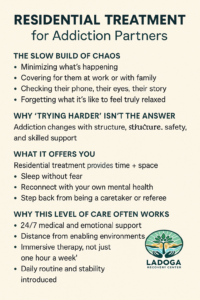Loving someone in active addiction rewires your nervous system.
You start listening for signs before they speak. You become an expert in facial expressions, energy shifts, and half-truths. Your life begins to orbit around unpredictability—until unpredictability becomes your baseline.
If you’re exhausted, constantly on edge, or quietly wondering if this is just what your relationship is now, take a breath. You’re not broken for loving them. And you’re not failing because love hasn’t been enough to stop what’s happening.
A residential treatment program might be the hard reset you—and they—never knew you needed.
The Slow Build of Chaos
Addiction often doesn’t blow in like a storm. It creeps in like fog. At first, it’s subtle: missed calls, mood swings, small lies. Over time, that fog thickens. The person you love is still in there, but you don’t always know how to reach them.
And meanwhile, you’re changing too. You may find yourself:
- Minimizing what’s happening
- Covering for them at work or with family
- Checking their phone, their eyes, their story
- Forgetting what it’s like to feel truly relaxed
This kind of vigilance isn’t sustainable. But when it becomes normal, it can feel almost impossible to imagine anything else.
Why “Trying Harder” Isn’t the Answer
Maybe you’ve already had the talks. The ultimatums. Maybe they promised to cut back, to go to meetings, to do better.
And maybe they meant it.
But addiction doesn’t change with promises—it changes with structure, safety, and skilled support.
That’s what residential treatment offers. It isn’t about “locking them away.” It’s about giving them the tools and time to come back to themselves. And giving you a moment of peace you don’t have to earn.
What Residential Treatment Actually Looks Like
At Ladoga Recovery Center in Indiana, our residential treatment program isn’t a punishment—it’s a medical and emotional sanctuary.
Clients live onsite in a safe, structured environment where they:
- Stabilize physically
- Work through emotional patterns and trauma
- Build coping skills that actually stick
- Receive support for co-occurring mental health conditions
All while being removed from the triggers, stressors, and access points that often sabotage early recovery attempts.
What It Offers You
This is a big one. Because you matter too.
When your partner enters a residential treatment program, the responsibility of “holding it all together” starts to shift.
You get time to:
- Sleep without fear
- Reconnect with your own mental health
- Step back from being a caretaker or referee
- Remember what still feels true about you—outside of crisis mode
You can love someone and still need space from the weight of their illness. That’s not selfish. That’s survival.

Why This Level of Care Often Works When Others Haven’t
If your partner has tried outpatient care, peer groups, or self-guided attempts at sobriety, you may be wondering: What makes this different?
Here’s what residential care does that other formats can’t:
- Provides round-the-clock medical and emotional support
- Creates real distance from enabling environments
- Offers immersive therapy, not just one hour a week
- Introduces daily routine and stability, which most clients haven’t felt in a long time
This isn’t a Band-Aid. It’s a deeper reset—for the brain, body, and spirit.
This Doesn’t Fix Everything—But It Opens the Door
It’s honest to say that treatment doesn’t guarantee recovery. But it does provide a starting point—one that’s far more grounded and supported than anything you or your partner can create alone.
For many, that starting point is found through Residential Treatment in Indiana, where structured support and evidence-based care create space for real change to begin.
And most importantly, it shifts the story.
Instead of chaos, there’s calm. Instead of reacting, you both begin to respond. And when your partner returns, they’re not coming back to the same patterns. They’re coming back with a new foundation—and so are you.
FAQ: Residential Treatment for Partners and Spouses
Will I get updates about their progress?
Yes. With your partner’s consent, our team includes you in family updates and educational sessions. We believe healing happens in relationships—not isolation.
Do I need to take time off work to participate?
No. Most partner sessions and family education are offered remotely and flexibly. You’ll receive resources and support without overwhelming your schedule.
What if my partner doesn’t want to go?
That’s common. Our admissions team can help guide you through what options exist, including interventions and motivational support. You don’t have to convince them alone.
Will they be safe during detox?
Absolutely. We offer medically supervised detox services as part of residential care to ensure your partner’s safety and comfort during withdrawal.
What happens when they come home?
Aftercare planning is a core part of our residential program. We help create a return plan that includes outpatient care, support groups, and ways for both of you to maintain healthy boundaries.
You Don’t Have to Live in Crisis Anymore
This isn’t just about getting your partner sober. It’s about shifting your whole life out of crisis mode.
The phone calls. The late nights. The pretending. The explaining. The hurt. It doesn’t have to go on like this forever.
You’ve already carried more than your share. You’ve shown up with love, patience, and strength that most people never see.
Now it’s time for someone else to carry the medical piece. The structure. The treatment.
And for you? It’s time to rest. To feel hope that isn’t held together by fear.
You’ve Held So Much—Let Us Carry It for a While
Call (888) 628-6202 or Contact Us to learn more about our residential treatment program in Ladoga, Indiana. There’s peace on the other side of this. We can help you get there.

